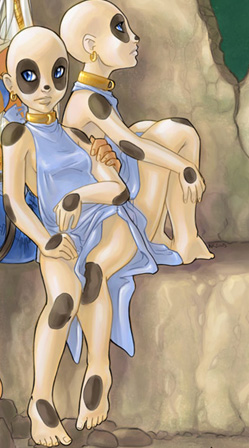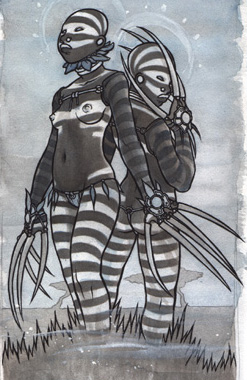Tribes of the Great Southern Hills
Though it is not unheard of to find tribal peoples wandering through the less-settled areas of the Great Southern Hills, they do not tarry long near the cities, finding them stinking and full of weak people incapable of surviving on their own. However, two tribes have lands near the Great Southern Hills: the Delzahn horselords and the Djala, called "panda-folk" by others.
The Delzahn
The Delazhn are a tribe of notorious horse-archers and raiders. They disdain their city-dwelling cousins as fat layabouts incapable of surviving in the wild; the city-dwelling Delzahn of Chiaroscuro consider the tribal folk to be the descendants of the cripples and cowards too afraid to answer the call of the Tri-Khan, and deserve the meager life they have, ekeing out a survival from the hot plains of the South while they live in luxury in the City of Glass.
On the plains, a young Delzahn learns to keep on the move. Children can easily handle a camel by their fifth birthday. Horsemanship comes next, though the young are rarely permitted to have mounts of their own. Horses are used for hunting and warfare; when a Delzahn is given his own steed, it signals the formal beginning of adulthood. After receiving a horse, the young nomad rides along for three days, contemplating the open savanna. Meanwhile, the tribe moves on, so the rider must track it down again.
Women and men have strictly divided roles. Women are expected to gather and tend to the tribe's possessions and their family's lineage, while men engage in hunting and war. At the same time, the Delzahn don't assign gender according to biology. Any member of the tribe may select a different gender. Called dereth, people who choose a gender different from their sex must wear a gray sash or veil at all times. Many dereth are shamans, since they are used to living in two different worlds. They are not discriminated against outside of the customs surrounding their chosen gender. Most dereth choose their role after the rite of passage: men return to the tribe with fresh meat from the hunt, while women return with a poem or song.
A tribe's wealth is measured by the number of animals it owns. Ultimately, the local orkhan (sept chieftain) owns all of the tribes' possessions, but he usually allows each family to tend its own herd in peace. Families do require his permission to trade anything with an outsider. Likewise, any theft offends the orkhan (and by extension, the entire tribe); stealing can provoke an escalating spiral of violence.
Fortunately, Delzahn customs provide for a less extreme solution — one that actually promotes stealing in certain circumstances. The thief can escape retribution by offering the tribe an unmarried adult. These newcomers are married into the offended tribe, which then demands a modest dowry.
The cycle of theft, marriage and gift giving gives the horde a common identity and fuels economic exchange. Delzahn marriages are polygamous, with multiple wives and husbands sharing a complex of tens and their share of the tribe's herd. Only one partner can be added to the marriage at a time; her status is delineated by the order in which she joined the family. Since the Delazhn have a taboo against killing or dishonoring any first-line relatives, this practice leads to a convoluted web of clan alliances and rivalries. A full sixth of Chiaroscuro's Delzahn population claims descent from the orkhans and thus the right to own property.
Taboos against internecine warfare have led to an elaborate system of ritual duels. The dueling circle is the favored choice for settling personal disputes. Here, the winner forces the loser out of the perimeter. Horse archery duels are used to resolve inter-clan affairs. Death is an inauspicious way to win, so the Delzahn fighters cultivate surprising restraint and ingenuity in combat. For this reason, Dlzahn mercenaries are foten hired to keep the peace throughout the civilized South.
Above the orkhans of each sept are the khans, each of whom claims dominion over a dozen or so septs through rights conferred by lineage and ritual combat. Nobles show their allegiance by granting all of their property to their liege, so each khan is fabulously wealthy. Nobles are expected to display their wealth as evidence of their following and tend toward irch, if garish, fashions. In fact, like the orkhans, the khans allow most of "their" property to reside with the people who care for it.
The Delzahn horde is far from unified, though the Tri-Khan currently holds the most power. The current Tri-Khan lives off the spoils from Tamas Khan, though, and the tensions between the Delzahn of the city and those of the plains grows.
Hundreds of years ago, Immaculate monks traveled South to convert the Delzahn. Between native influences and the fact that the Immaculate Philosophy's dogma was somewhat less developed than it is now, a weird heterodoxy took hold with the horde. The dominant branch of the faith is heretical by the orthodox view, promoting spirit of worship as a de facto veneration of the Immaculate Dragons. Later missionaries have elicited almost no interest from the population (though the Tri-Khan courts them to gin the Realm's favor), leading to sporadic violence between Immaculate shamans and orthodox monks.
- Taban Arslan Clan (Pop. 1600): The Five Lions Clan is one of the most fearsome of the nomadic Delzahn tribes — they are also the most critical of city-dwelling Delazahn. Any urban dwellers that they capture on raids are put to the sword immediately, and they refuse to foster children from kin who have gone to the cities. Indeed, they hold funerals for their kinfolk who choose urban life. The Taban Arslan are known to have allies among the dholemen who harass the citizens of Chiaroscuro. The khan of Taban Arslan is called Qutlugh Arslan, or Fortunate Lion.
- Mongke Gal Clan (Pop. 950): The Eternal Flame Clan claims the watering holes the furthest south of the Plain of Windswept Bones, which are the Delzahn lands. Its khan, a one-legged man named Sube, or Needle's Eye, is one of the most skilled archers of the Delzahn, and does not hesitate to delve deeper into the deserts to raid caravans traveling north with gems and firedust.
- Vachir Oyugun Clan (Pop. 1300): The Thunderbolt Wisdom Clan is the second-largest of the clans. They are led by Suren Unegen, the Majestic Fox, a dereth warrior who has many wives and husbands, and enjoys claiming new ones from those cities he raids. The shamans of the Vachir Oyagun are powerful, with allies among the air elementals of the great windswept plains.
- Minghan Qutugh Clan (Pop. 1150): The Thousand Holies Clan is known for its close association with the gods of the Delzahn, and for their rejection of even the basic Immaculate religion. It is only fitting, then, that their shamans act as the keepers of a great secret: the whereabouts of the tomb of Tamas Khan. The clan guards the area around the site of Tamas Khan's thumnas, but only the shamans are permitted near it.
The Djala
The Djala are a race of small humanoids, rarely growing taller than five feet in height. They are completely chalk-white and hairless, with large black discolorations in a dot-like pattern on their bodies. Outsiders say that they look like the pandas of the East and Blessed Isle, but none of the Djala have ever really seen one of those creatures.
Because of their tremendously pale skin, Djala are a nocturnal tribal folk, spending their days in the cool caverns that they claim as their clan homes. Each clan lays claim to a different set of caverns. At night, they range hours away, hunting. Their favored weapons are the stone discus and the short spear.
There are also small bands of another strange humanoid, called the jikari. Jikari do not truly live a tribal lifestyle; they exist more as bands of hereditary bandits and raiders. They have long lived in djala lands, and make their livings currently by raiding djala encampments and hunting parties, carrying away the survivors to sell as slaves. It is known that for as long as there have been the peaceful djala, the vicious jikari have hunted them.

|

|